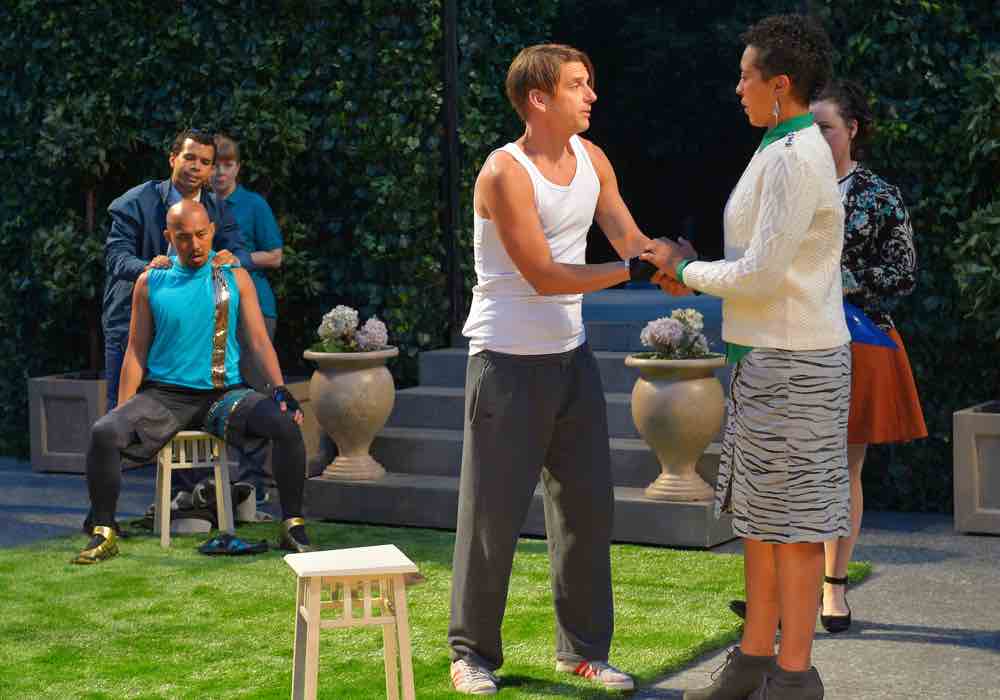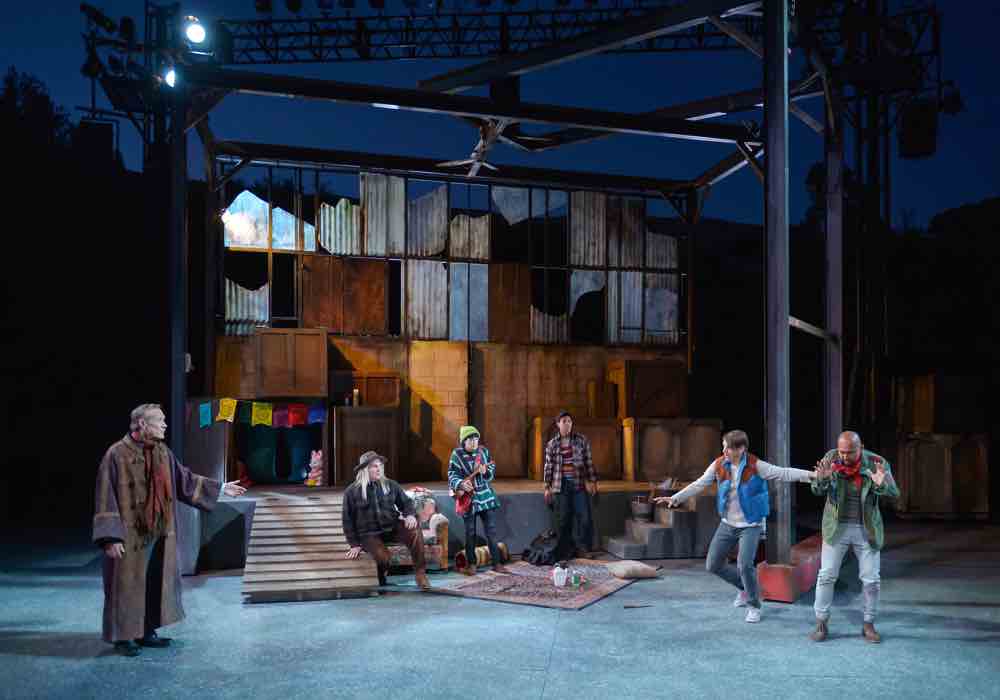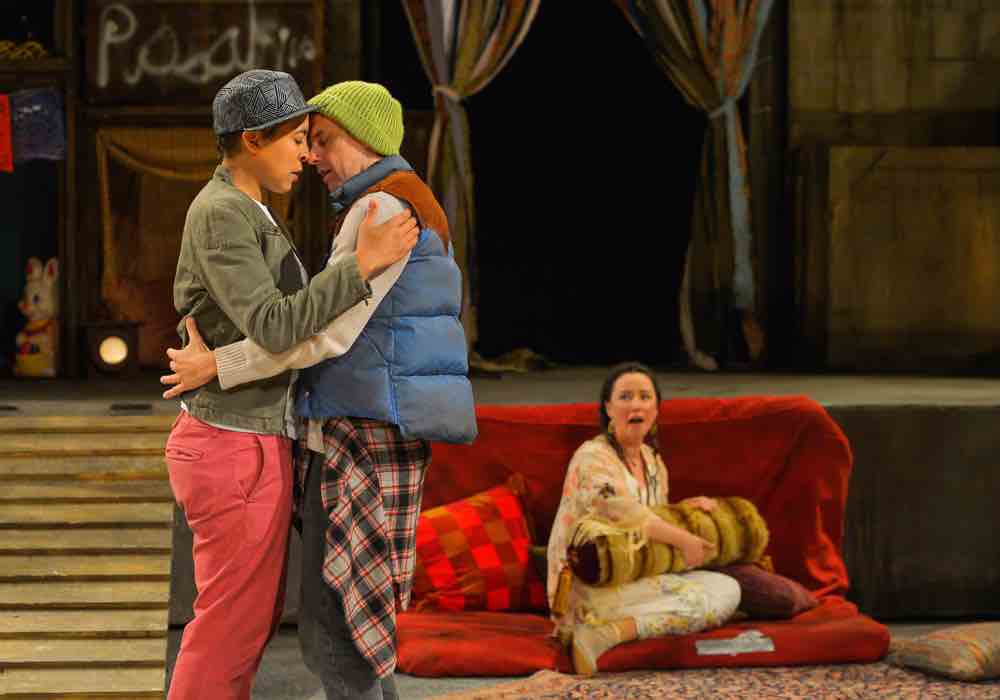Desdemona Chiang’s As You Like It at CalShakes is an inventive modern dress production emphasizing doubles, disguises, and the performance of love.

In the changeover from Act I to Act II of Desdemona Chiang’s As You Like It at CalShakes, the set from court does an almost 180 turn to reveal its opposite, The Forest of Arden. The court was a green, well-landscaped garden with roll-out grass. The Forest of Arden is an urban wasteland with broken windows, unfinished wooden fixtures, and dilapidated furniture. As we watch the set transform, so, too, does Duke Frederick (James Carpenter) transform into the brother he banished, Duke Senior, merely by switching the overcoat he’s wearing. It’s a smart move for a play full of doubles — two dukes, two fools, two cousins, and two sons of Sir Rowland De Boys — in which (mostly) young people leave court for the wild forest, wear disguises, and in so doing, discover themselves and their hearts.
[clickToTweet tweet=”Chiang highlights parallels between the court and the rundown shadow court that is ‘more free from peril’.” quote=”Chiang highlights parallels between the court and the rundown shadow court that is ‘more free from peril’. “]
Because the set has two faces and so does Carpenter, Chiang invites us to find the parallels between the court and this sort of rundown shadow court that is “more free from peril” — a refuge for outcasts. As Duke Senior explains about life in the Forest, “Hath not old custom made this life more sweet/Than that of painted pomp?…Here feel we but the penalty of Adam,/The seasons’ difference, as the icy fang”. The forest lacks the comforts of court, being cold and rough where the court was lush and warm, but it’s safe from backstabbing and political machinations. Like Duke Frederick, Duke Senior has a group of followers in the forest, but there’s a warmth and camaraderie between them that is missing at court. Tellingly, the entertainment at court is a wrestling match; in the forest, it’s singing. While Touchstone the fool wore motley at court, the melancholy Jacques can only dream of being an official fool, for such formalities and wealth don’t exist in the forest where he lives.

Entering the Forest of Arden is a transformative experience. When Duke Frederick banishes Duke Senior’s daughter, Rosalind (Jessika D. Williams), for stealing the spotlight from his daughter, her cousin Celia (Maryssa Wanlass), the two depart for the forest. In a hat and trousers, Rosalind becomes a man, Ganymede, while Celia dresses down as a more common woman, Aliena. As a man, Rosalind can express her thoughts and feelings openly — and she can test the waters with her paramour, Orlando, while saving face. Orlando, who sealed his fate in more ways than one by winning a wrestling match at court, flees to the forest for fear of his brother’s retaliation. Here, Duke Senior offers him a hat and coat to keep him warm in the chilly winter. The anger towards his unfeeling brother evaporates as soon as he dons the new layers, which frees Orlando to become a full time doting lover, marring trees with bad love poems.
Because the production is staged at the Bruns Theater in Orinda, an outdoor amphitheater set against the rolling hills, lush forest, and wild turkeys of the East Bay, Chiang can create the feeling of a credible forest without having a single tree onstage. We know we’re sitting in the middle of nature, and Chiang draws attention to this by letting her forest be a place where people get dirty and live more roughly. We also find ourselves empathizing with the fellowship of Duke Senior’s men, huddled in blankets around a fire singing songs. After all, we’re watching theatre in the cold ourselves, covered in blankets, too. The forest becomes instantly inviting and familiar in a way the bright and over-manicured court could never be. I’m not sure this justifies swapping Shakespeare’s lyrics for Bob Dylan’s songs, but Chiang does succeed at setting the right tone.

Chiang constantly makes us aware of our role as the audience, while creating internal audiences on stage whenever would be lovers interact, to remind us how easy it is to switch between judging and being judged. Where a patch of grass was the site of the wrestling match and other formal matters at court, there’s an elevated platform, which serves as the stage in the forest. Somebody else is always on stage when Touchstone woos his farm girl Audrey, or Rosalind-as-Ganymede constructs a plan to pretend to be Rosalind to cure Orlando of love (as an excuse to see him), or the shepherd Silvius pursues the country lass Phoebe in vain. Interactions between lovers always seem like histrionic theatrics to those on the outside looking in: Rosalind can poke fun at the lovers’ quarrel between Phoebe and Silvius, but Celia judges Rosalind’s behaviour toward Orlando with just as much knowing humour. No one is immune. By the time Jacques (Jomar Tagatac) gives his famous speech, “All the world’s a stage,” we feel we’ve been living it.
[clickToTweet tweet=”‘The forest becomes instantly inviting and familiar in a way the bright and over-manicured court could never be.'” quote=”The forest becomes instantly inviting and familiar in a way the bright and over-manicured court could never be.”]
Chiang’s most radical decision is to depict the lovers with a modern touch: horny and unafraid of expressing it. This goes hand in hand with Chiang’s attention to the wit in the dialogue, the way lovers tend to play with words, lobbing them back and forth at one another: their verbal foreplay gets mirrored in the physicality of the production, and even Audrey and Touchstone rally over the appropriateness of a handshake. This approach is particularly effective at driving our investment in Orlando and Rosalind as a well-suited match. Too often, Orlando is the lovesick pretty boy, and it feels like Rosalind is settling. Not so here. While it’s true that Rosalind first falls for his looks, it’s the way they exchange witticisms, first at the wrestling match, and later with Rosalind in disguise, that makes them a believable couple. When Rosalind-as-Ganymede-as-Rosalind and Orlando get into the most passionate part of their role play, it actually gets steamy, with limbs intertwined and snogging.
[clickToTweet tweet=”‘Chiang depicts the lovers with a modern touch: horny and unafraid of expressing it.'” quote=”Chiang’s most radical decision is to depict the lovers with a modern touch: horny and unafraid of expressing it.”]
Because As You Like It involves so many disguises, how to deal with gender and gender performance is a crucial but open question. Chiang avoids stereotypes here. Audrey is a scrappy farmer in overalls. Rosalind has cropped hair, and her disguise as Ganymede barely registers as such: her breasts aren’t bound and the only real wardrobe change is from a skirt to pants. The easy way in which Rosalind expresses her sexual desires for Orlando to Celia, and acknowledges them to herself, is also quite modern. It’s not just the modern dress that makes the production feel relevant.
Unfortunately, these modern touches regularly cause contradictions in Chiang’s interpretation that serve to muddle the plot. If Ganymede is a weak disguise, and Orlando goes so far as to even kiss him, how does he not figure out the game? The moment that Orlando realizes Ganymede is Rosalind differs in each production. In this case, it’s hard to believe he really only figures it out when her threadbare ‘disguise’, i.e. a pageboy hat, is removed.
[clickToTweet tweet=”‘Many of the modern touches regularly cause contradictions in her interpretation that muddle the plot.'” quote=”‘Many of the modern touches regularly cause contradictions in her interpretation that muddle the plot.'”]
Similarly, the freedom with which Rosalind expresses her feelings to others, including Orlando, makes it hard to understand why she keeps up the Ganymede charade. Rosalind doesn’t seem to doubt his affection, nor does she seem to need the disguise to overcome her shyness. The need for a disguise for self-preservation is clear at court, when speaking out for her father gets Rosalind banished with a death threat. But the forest is a welcoming place, not a scary one, where women like Audrey are fiercely independent. Rosalind may be observed by internal audiences on stage, but they’re merely quietly mocking, not imminently dangerous.
Worse, Ganymede is regularly critical of women, which makes little sense in this world where Celia is full of wisdom, knowingly watching Rosalind’s brushes with love, and where even the simple country girls manage to get one up on their more educated male lovers. Since Celia is Rosalind-as-Ganymede’s most regular audience for her interactions with Orlando, spouting misogynistic vitriol is not only unwarranted, for Celia is a smart and supportive friend, but cruel. If anything, the lovesick fools in this production are the men — the bad poet Orlando, the immediately lovesick Oliver, the undeterrable Silvius, and even the persistent Touchstone — while the women rebuke them, or at least take their time to accept them and acknowledge their feelings. Rosalind’s statements about the fragility of women are unjustified in the world of this production: she can’t be saying them just to perform masculinity because the men in this world don’t behave so hatefully toward women. Instead, it seems like she believes it all herself — perhaps an indication of her own self-loathing?
CalShakes was an early adopter of colour blind casting, and in this production, it gives us diverse and incredibly talented actors. Despite Chiang’s confused direction of Rosalind, Williams is a standout stage presence, full of charisma, sexual desire, and dominating power. When Jomar Tagatac first appeared as Charles the Wrestler, his facility with the verse and mesmerizing presence were unprecedented for such a small role; it all made sense when he later appeared as Jacques, though he, too, was ill-served by some of Chiang’s more esoteric choices. Why, for example, does Jacques deliver his “All the world’s a stage” speech while sobbing? It’s unexplained and unmotivated, even though Tagatac does it well.
Listen to the Seventh Row team talk Shakespeare on the 21st Folio Podcast here.

